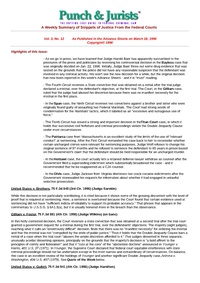One of the issues decided in this case is that a district court may not delegate its authority to set the amount and timing of fine payments to the Bureau of Prisons or to the probation officer. The Court noted that, like restitution, the statutory duty to impose fines …
In this case, the Court reverses a conviction on the grounds that the trial judge committed plain error by allowing two alternate jurors to deliberate and sign the verdict form along with the 12-person jury. It notes that Rule 24(c) provides in part that "an alternate juror who does …
In this case the Eighth Circuit considered whether it can deny a reduction for acceptance of responsibility based on criminal conduct unrelated to the crime of conviction - here, a urinalysis test that indicated that the defendant had used marijuana. The Court noted that the Sixth Circuit had held, …
Think it's hard to get a severance motion granted? Well, this case shows just how hard. One defendant moved for a separate trial on the grounds that evidence of the "shocking callousness" on the part of his co-defendant would severely prejudice him. His co-defendant apparently sat on the body …
This case is cited principally because it holds that sentencing disparities between similarly situated defendants are not a valid basis for a downward departure under the Guidelines. After concluding that the Court had jurisdiction to review the appeal under the provisions of 18 U.S.C. § 3742(a)(1) (since the defendant …
This is a case with a long and intricate history that raises some fascinating questions about the use of "relevant conduct" at sentencing. The defendant pled guilty to several RICO violations, principally violations of the Travel Act (18 U.S.C. § 1952), and he was sentenced to 97 months in …
This is one of our all-time favorite cases, back for a reprise. In one of the many earlier decisions involving this same defendant, after he had been sentenced to six hundred and sixty (yes, 660!) years in prison by the district court in Rhode Island, some temperate prosecutor from …
In this case [at headnotes 9-10], the court emphatically rejects the argument that a drug courier is necessarily entitled to a sentence reduction under § 3B1.2 for being a minor participant. It observes that "couriers are an indispensable part of drug dealing networks. . . . When police apprehend …
The Court explained the workings of Rule 17 as follows: "Rule 17 outlines the method by which the Government and criminal defendants may procure subpoenas from the district court. When a party requests a subpoena, subsection 17(a) directs the clerk to issue the subpoena "signed and sealed but otherwise …
While this decision is not particularly scintillating, it is cited because it shows some of the growing discontent with the level of proof that is required at sentencing. Here, a sentence is overturned because the Court found that certain evidence used at sentencing did not have "sufficient indicia of …
Case held that defendant was entitled to an evidentiary hearing on the quantity of drugs because the district court failed to make the required explicit findings.
Case held that possession of 5.72 grams of crack was sufficient to sustain a conviction of possession with intent to distribute - a conclusion supported in large part based on a letter to the editor of the Washington Post.
Case noted that special scrutiny must be given to the quantity of drugs charged to a defendant because it usually will be the single most important determinant of a defendant's sentence.
Citing U.S. v. Collado, 975 F.2d 985, 995 (3rd Cir. 1992), the court emphasized that "we should …
As expected, the Second Circuit reverses another decision by Judge Weinstein, in which he granted a downward departure under the Guidelines so that the defendant and his wife could have a child during the wife's remaining childbearing years. Judge Weinstein had based his departure on U.S.S.G. § 5H1.6 (family …
This is one of our all-time favorite cases, back for a reprise. In one of the many earlier decisions involving this same defendant, after he had been sentenced to six hundred and sixty (yes, 660!) years in prison by the district court in Rhode Island, some temperate prosecutor from …
This case is one of those surrealistic excursions into the fantasyland of the Guidelines. After the defendant escaped from prison, he was captured and charged with escape. His Presentence Report recommended that he receive a two level decrease for acceptance of responsibility and no enhancements or upward departures. Before …
